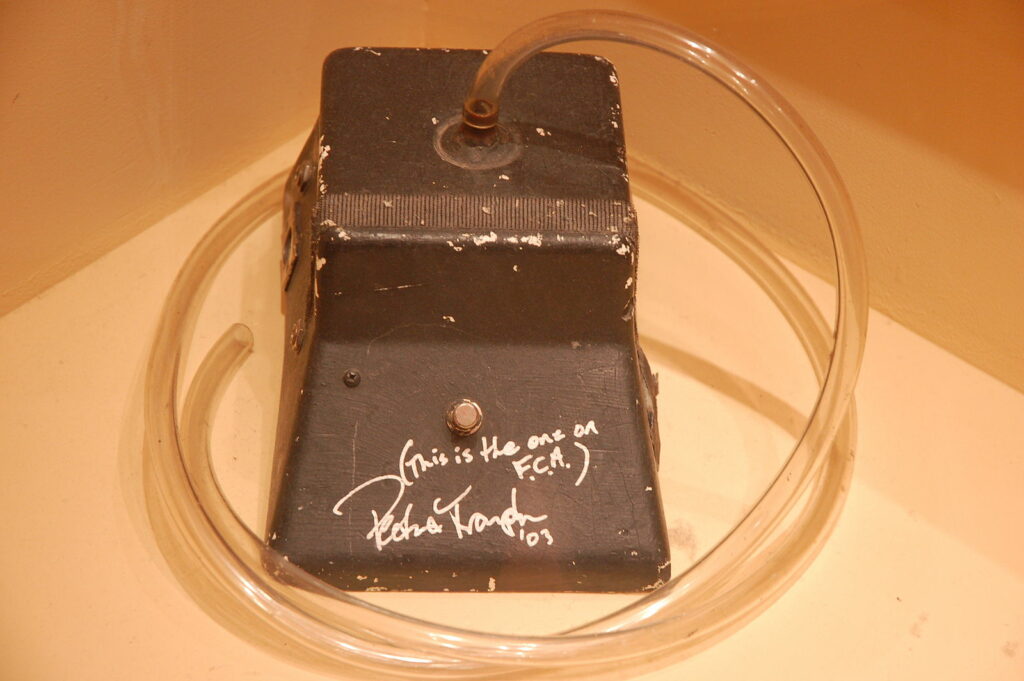
Talk box. Photograph by Carl Lender. Wikimedia Commons, Licensed under CCO 2.0.
This week, the Review is publishing a series of short reflections on love songs, broadly defined.
I liked spending evenings in my friend Zack’s living room when I moved to Los Angeles. I would make the short drive down Sunset in the dark and park in the lot behind a ceviche stand, then climb a flight of stairs to his apartment and set up on the couch. Zack produces music for rappers and vocalists, mostly Angelenos like him, and his living room was a deconstructed studio, with sequencers and MIDI samplers occupying his coffee table and clusters of new speakers mushrooming every few weeks, filling vacant corners. This was in the fall of 2020; when we would hang out, he would show me the dregs of his midday Ableton foolings, scraps of beats that mostly never coalesced into songs. I think Zack and I became friends years earlier largely because we snagged on musical details similarly. He knew I liked to hear the drafts.
These flotsam sessions would fade into trading favorite songs, newly discovered or resurrected for driving playlists. One night, Zack showed me “I Want to Be Your Man” by the late Roger Troutman, the star boy of the electro-funk family band Zapp that emerged in the late seventies. Roger and his brothers—he was the fourth of nine, growing up in Hamilton, Ohio—set themselves apart by using the talk box, a device both futuristic and analog in its time. A talk box delivers sound from a source, like an electric guitar or a synth, into a player’s mouth through a plastic tube. The player, clenching the tube with their teeth, shapes the sound by mouthing lyrics, and it is then picked up by a microphone. The result is a tinny, soulful kind of proto-vocoder tone produced by a musician who looks like they’re siphoning gas. Roger built his first talk box with the tubing from a meat freezer in his family’s garage; the “Electric Country Preacher,” as he called the tool, defines the relaxed but fevery ballad that he wrote in 1987. Roger’s bare tenor croons the verses of “I Want to Be Your Man” over bouncy bass, declaring his love for a woman who may or may not want him back. His talk box’d voice careens in for the chorus, pleading the titular phrase four times in a row. I would leave Zack’s and drive back to my house, yanking the emergency brake to park on a steep incline while Roger descended the scale sappily through the aux: “My mind is blind at times I can’t see anyone but you / Those other girls don’t matter, no, they can’t spoil my view / I must make you understand, I want to be your man.”
I had gone to LA in the wake of a breakup, the end of a long relationship with the first, and still the only, person I’ve been in love with. This love was not so much the pining kind that Roger feels in the track, but one that materialized between us in the dark, or wholly outside of demarcated time, like a warped fact in a dream. I knew how to love only him and often thought that would be the case until I died. We finally came to terms with the fact that we wanted radically different lives and that we had each failed to persuade the other. We doctored a rental car contract so he could drive back across the border to Canada, and I increased the distance between us by moving further west. I felt a numb relief that muffled my sorrow.
Being alone is sometimes easier than imagining feelings of that magnitude again. How dramatically I had been shaped by that person—an experience I worried would make me somehow unable to accommodate future attachments. There is something about Roger’s syrupy song of desire that has helped me understand this idea to be cowardly and false as time passes, though. “I Want to Be Your Man” revels in the pleasure of wanting someone and wanting to be changed by them, as well as in the unavoidably destabilizing effects of falling in love. Vision blurs and communication fails—“I tried, I tried, I tried, I tried to tell you how I feel, but I get mixed up.” (“Sooooooo mixed uuuuuuupp.”) These chaotic pursuits are still generative in the world of the song, in which a plastic tube can let a man possess the soul of an electric instrument and let a silently mouthed word transmit inhuman timbres. Lately I’ve been trying to allow transformations of the heart on small scales, embracing flings or swells of naive yearning. Drafts of myself spawn in front of me, then eventually walk off and die in some emotional outback, but I guess that’s where we all emerge from to begin with. In How to Wreck a Nice Beach, a book about the history of the vocoder by Dave Tompkins, Roger’s collaborator Bootsy Collins explains that, even for masters, the process of the talk box isn’t entirely comprehensible. “It is a special gift, and it is forbidden for you to know the secrets,” he says. “It will always be a mystery.”
Elena Saavedra Buckley is an associate editor at Harper’s Magazine and The Drift.
from The Paris Review https://ift.tt/3KtzRm5
Comments
Post a Comment